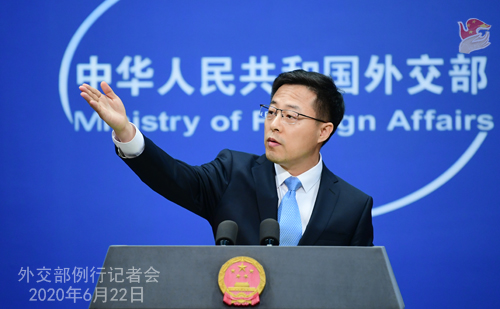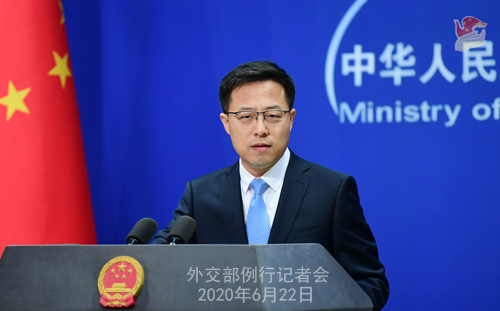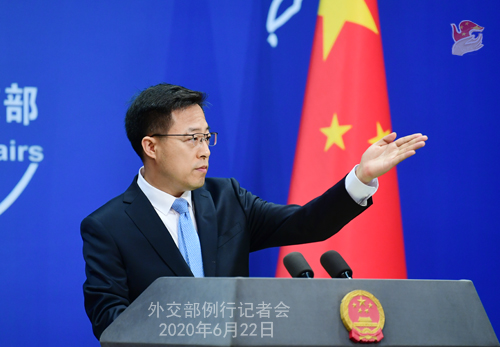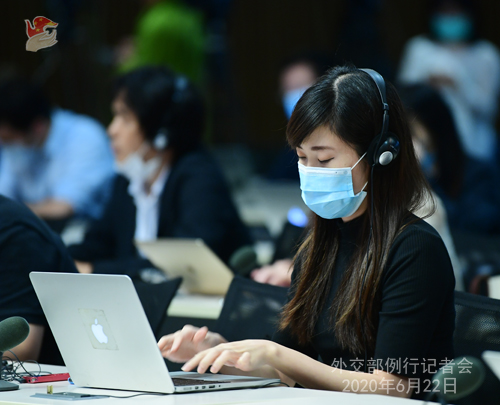| Foreign Ministry Spokesperson Zhao Lijian's Regular Press Conference on June 22, 2020 |
| 2020-06-22 23:03 |
|
CCTV: US Secretary of State Pompeo attended the Virtual Copenhagen Democracy Summit on June 19. He criticized China on a series of China-related issues. I wonder if you have a comment? Zhao Lijian: Mr. Pompeo once again leveled wanton criticism against China and attempted to sow discord between other countries and China. We are firmly opposed to this. His remarks concerning China run counter to plain facts and basic norms governing international relations. They only serve to further expose his deep-seated Cold War mentality and ideological bias. The Chinese people have long seen through this. People won't buy a word he said. We urge him to correct his mistake, stop spreading political virus, and work to promote instead of undermining China-US cooperation. Macau Monthly: The decision on China's participation in the Arms Trade Treaty was approved at the recently concluded 19th Plenary Session of the 13th NPC Standing Committee. Do you have any comment? Zhao Lijian: The NPC Standing Committee's decision on joining the Arms Trade Treaty was recently approved at the 19th Plenary Session of the 13th NPC Standing Committee, which means the domestic legal procedures for China's participation in the Treaty have basically completed. After finishing all legal procedures, China will submit the instrument of accession through diplomatic channels as soon as possible, which shall be deposited with the Secretary-General of the United Nations. China attaches high importance to the problems caused by illicit transfer and abuse of conventional arms. We support the purposes and goals of the Treaty, and agree with the idea to take necessary measures to regulate international arms trade and combat illicit arms transfer. As a country in regular arms trade, China always strictly regulates export of military articles and has put in place a full-fledged policy and legal system of export control, with policies and management measures meeting or in some areas even exceeding ATT requirements. It is worth pointing out that China only allows export to sovereign states, not non-state actors. This fully demonstrates its high sense of responsibility. China calls on all parties to strictly regulate export of military items, disallow export to non-state actors, stop interfering in sovereign nations' internal affairs through arms export, and earnestly uphold the purposes and principles of the UN Charter. Accession to the ATT is another important step China has taken in supporting multilateralism and advancing the building of a community with a shared future for mankind. It will produce a positive effect in enhancing the treaty's universality and efficacy. China will continue its tireless efforts to safeguard and promote regional and global peace and stability. Feature Story News: Why is it that Michael Kovrig and Michael Spavor have been denied consular visits as has been repeatedly suggested by the Canadian side? Zhao Lijian: China has made its position clear. The relevant Chinese authorities have suspended consular visits to the detainees in the midst of the epidemic. This is not specifically targeted at Canadian citizens in custody.
The Paper: In response to China's public prosecution against Michael Kovrig and Michael Spavor, Canadian Prime Minister Trudeau said on June 19 that he was "very disappointed" and it was "a real shame" China did not appear to understand that governments in Canada could not interfere in the justice system. Canada will continue to put pressure on the Chinese government to cease the arbitrary detention of these two Canadian citizens who are being held for no other reason than the Chinese government is disappointed with the independent proceedings of the Canadian judiciary. Besides, some Canadian media believe China's prosecution against Kovrig and Spavor is a retaliation for Meng Wanzhou. Do you have any comment? Zhao Lijian: The recent erroneous comments from the Canadian side clearly reveal the double standards pursued by Canada in so-called "judicial independence" issues. The two Canadians were arrested and prosecuted by the Chinese competent authorities in accordance with law for suspected crimes undermining China's national security; this is not "arbitrary" detention at all. The Chinese judicial organs handle cases independently and guarantee the lawful rights of those Canadian nationals according to law. We urge the Canadian leader to respect rule of law and China's judicial sovereignty, and stop making irresponsible remarks. The Meng Wanzhou incident is in essence different from the cases of the two Canadians. Anyone without bias can see that it is a serious political incident. The US aims to oppress Huawei and other Chinese hi-tech companies, and Canada is its accomplice. We strongly urge Canada to redress its mistakes, release Meng Wanzhou and ensure her safe return home as soon as possible. CCTV4: On June 19, the International Atomic Energy Agency (IAEA) Board of Governors voted to adopt a resolution on verifying Iran's compliance with its safeguards obligations. China and Russia voted against it. I wonder if you have a comment? Zhao Lijian: China supports the IAEA in playing its role in an objective, professional and neutral manner in verifying Iran's compliance with its safeguards obligations. We are against politicizing its work. The IAEA explicitly states that the safeguards issue is neither urgent nor poses a proliferation risk. The Iranian side also expressed its clear wish to resolve issues through dialogue with the agency. Under such circumstances, China does not approve of actions that artificially exacerbate tensions and escalate the situation. We hope relevant parties will remain calm, exercise restraint, and support Iran and the IAEA in resolving differences through dialogue and cooperation. On the Iranian nuclear issue, China's unwavering aim is to uphold the JCPOA, multilateralism, peace and stability in the Middle East, and the international order based on international law. We stand ready to work closely with relevant sides for the political and diplomatic settlement of the Iranian nuclear issues. Feature Story News: Canada will soon make a decision on whether to ban Huawei from its 5G network. If it does so, what consequences can Canada expect? Can I clarify the question I made earlier? Is there a reason why video consular calls have been denied to Michael Kovrig and Michael Spavor? Zhao Lijian: On your first question, China's position on the issue of 5G technology is clear and consistent. The Chinese government always encourages Chinese companies to do business overseas in accordance with international rules and host country laws. In the meantime, we hope relevant countries will provide a fair, just and non-discriminatory environment for Chinese companies operating there. On your second question, relevant Chinese authorities manage the detainees in accordance with laws and regulations. Kyodo News: Japan's Ishigaki city assembly adopted a bill to change the so-called "administrative designation" of Diaoyu Dao. Does China have any comment on that move? Zhao Lijian: Diaoyu Dao and its affiliated islands are China's inherent territory, and China is determined and resolved in safeguarding its territorial sovereignty. Japan's adoption of the so-called name-changing bill is serious provocation against China's territorial sovereignty, which is illegal, null and void. It cannot change the fact whatsoever that Diaoyu Dao belongs to China. We firmly oppose this move taken by Japan. We have lodged stern representations with Japan through diplomatic channels and we reserve the right to make further responses.
AFP: We want to ask about President Trump who referred to the coronavirus pandemic as "Kong Fu virus" at a recent campaign rally in Oklahoma. Does China have any response to his remarks? Zhao Lijian: We noted relevant remarks. WHO and the international community are unequivocally opposed to linking the virus to specific countries and regions as well as stigmatization. China firmly opposes any remarks that use the issue of the origin of virus to stigmatize others. We have noted that many insightful people in the US have publicly condemned the use of the epidemic to stigmatize others and make racist remarks. Nihon Keizai Shimbun: According to The Economist, China is getting more likely to establish an ADIZ in the South China Sea. Could you confirm if it's true? Zhao Lijian: I'm not sure what the source of this report is, but I'd like to stress that every country has the right to establish an ADIZ and to decide whether to establish an ADIZ based on the intensity of the threats it faces in air defense security. In the light of the air security threats China faces above relevant waters of the South China Sea, China will carefully and prudently study the relevant issue taking into account all factors. CCTV4: On June 19, Foreign Ministers of France, Germany and the UK published a statement on the JCPOA. Does China have any comment? Zhao Lijian: We noted the E3 foreign ministers' statement on the JCPOA. China believes that upholding and implementing the JCPOA is the only right way to resolve the Iranian nuclear issue. State Councilor and Foreign Minister Wang Yi recently wrote to UN Secretary-General and the rotating president of the Security Council to stress that the JCPOA, endorsed by Security Council Resolution 2231, is an important outcome of multilateral diplomacy and a key element in international nuclear non-proliferation system. China firmly upholds the authority of the Security Council resolution and the efficacy of the JCPOA. All provisions in Resolution 2231 should be earnestly carried out. Iran's reduction of compliance is a result of the US maximum pressure. We urge the US to abandon unilateral sanctions and "long-arm jurisdiction", and return to the right track of observing the JCPOA and the Security Council resolution. In the meantime, all parties to the JCPOA should take concrete measures to restore the balance of rights and obligations under the Agreement. As a quitter from the Agreement, the US has no right to ask the Security Council to launch the snapback mechanism that allows the re-imposition of sanctions. We noticed that the E3 foreign ministers reaffirmed their commitment to upholding the JCPOA and implementing the Security Council Resolution 2231. They believe that the strategy of maximum pressure will not effectively address shared concerns about Iran's nuclear program. As any unilateral attempt to trigger UN sanctions snapback would have serious adverse consequences in the UNSC, they would not support such a decision which would be incompatible with current efforts to preserve the JCPOA. China will work with the E3 and the larger international community to stick to the JCPOA and Security Council resolution, uphold multilateralism, and work for the political and diplomatic settlement of the Iranian nuclear issue. In the meantime, we will resolutely safeguard our own legitimate rights and interests. Reuters: Can you confirm how many casualties has China suffered in the clash at the Galwan Valley? Zhao Lijian: China and India are resolving the issue on the ground through military and diplomatic channels. I have no information to offer.
|
| |||||||||||||||
|
|||||||||||||||





